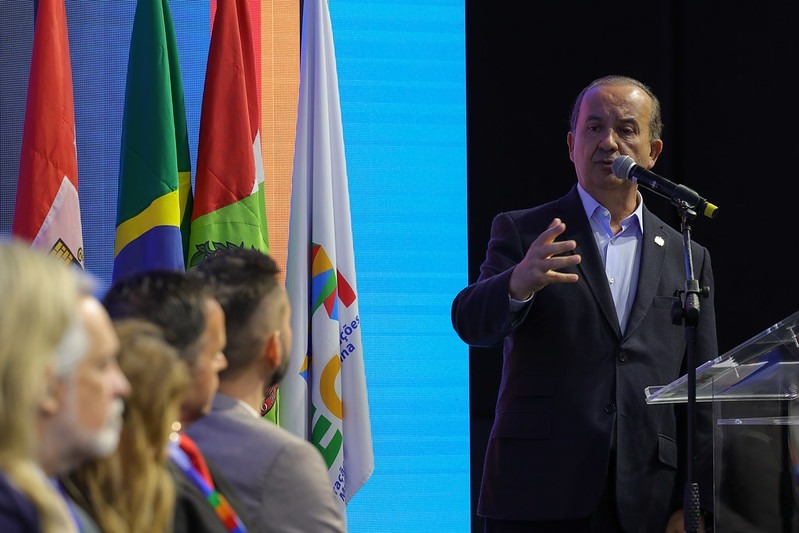Governor Jorginho Mello reinforces the importance of the State + municipalities partnership in COMAC 2023

Governor Jorginho Mello participated in the opening of the largest municipal meeting in Santa Catarina, the Congress of Municipalities, Associations and Consortiums of Santa Catarina (COMAC-SC), this Wednesday, 27th, in Florianópolis. At the event, the governor highlighted programs and advances in state management in almost ten months of government and reinforced the importance of partnership with municipalities. The meeting runs until September 29th at Arena Opus, in São José.
“It is in the municipality that life happens. It was with this in mind that we created the “SC Levada a Serio” Program ( SC Taken Seriously) to listen to the mayors and understand the needs of each city in Santa Catarina. And we can already see the results of this initiative. In just over 30 days, we have already paid half of the Special Voluntary Transfers, the TEVs . It’s R$256.1 million for 161 cities. We guarantee works for the entire State, with responsibility”, said Jorginho Mello in the first panel of the Congress.
Throughout this Wednesday, various topics will be addressed in thematic rooms such as public communication, security in schools, governance in public administration, digital government and challenges in Santa Catarina’s health sector.
The search for opportunities beyond Brazilian borders is also one of the highlights that the Government of Santa Catarina seeks to present at the stand it holds at the event. “No one better than the municipality to “sell’ itself to the world. This will be done in an integrated and coordinated manner, in accordance with the innovative vision of Governor Jorginho Mello”, explains the Secretary of Foreign Affairs of Santa Catarina, Juliano Froehner .
The event is organized by the Federation of Consortia, Associations and Municipalities of Santa Catarina (FECAM). Under the motto “Connecting cities, building the future”, the Congress will promote comprehensive debates and discussions on municipal public administration, with a focus on innovation, sustainability and efficient management. Around 5,000 people are expected to participate during the three-day event. Representatives of the federal and state government, mayors, vice mayors, secretaries, businesspeople and experts will participate.
With 89 municipalities in Santa Catarina represented by 305 initiatives, this edition of COMAC promises to be an enriching forum to promote collaboration and growth in local communities. The event is sponsored by Fepese , IPM, BRDE and Ciasc .
“COMAC is essential, because we are one State. In fact, it is in the municipalities that things really happen. However, it is the strong arm of the State what ensures that we have the installed capacity to develop our actions. So, this open door, this proximity for dialogue, for the execution of actions brings solutions to our common difficulties”, explains the president of Fecam and mayor of Vargem, Milena Lopes.
Among the highlights from the agenda of events, which includes the presence of representatives from the state government, are panels on safety in schools, transfers of resources to municipalities through TEV and also on public health in Santa Catarina, with the participation of secretary Carmen Zanotto.
“This congress of municipalities, associations and consortia comes precisely to demonstrate how important this interaction, this sharing of ideas. And the State government is a partner of this matter. It is already an ideology of the State government to be municipalist. It is important that these spheres are integrated, because this reflects benefits for all people in Santa Catarina”, highlights Estener Soratto , secretary of the Civil House.
This year, one of the new features is the Communication Room, dedicated to public communication issues, covering topics such as “Public management that becomes news”. Furthermore, city halls will have the opportunity to present their good practices, selected from the FECAM Good Practices Bank, which aims to highlight initiatives aligned with the UN Sustainable Development Goals (SDGs).
Photo: Roberto Zacarias / Secom
